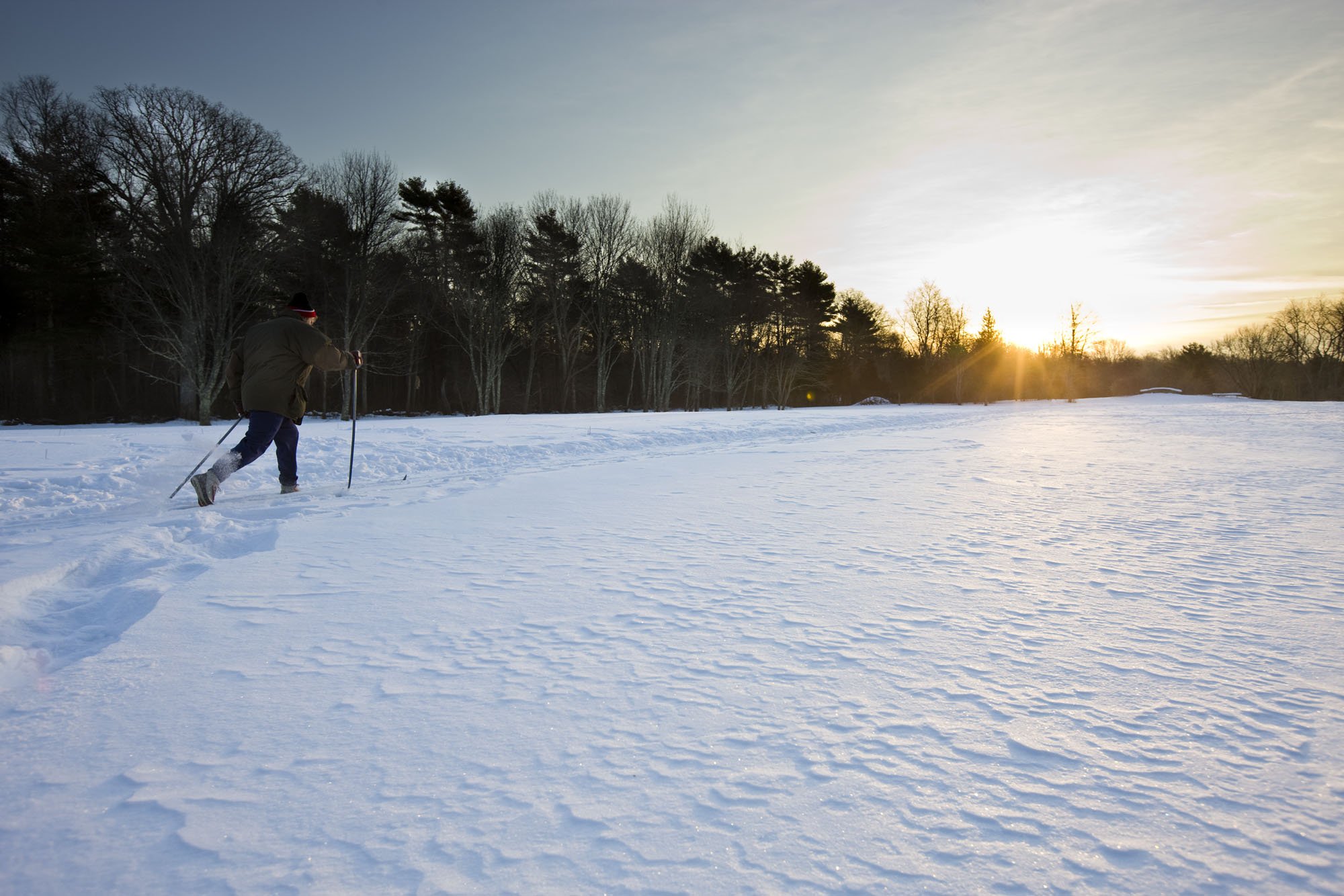In March 2022, Wildlands Trust received an anonymous grant from a private foundation to fund the initial planning and design stages of a significant revitalization project proposed for Brockton’s 700-acre D.W. Field Park. Working collaboratively with city officials, including the Mayor’s Office, and several community-based and statewide partners, the conservation organization says the proposed project will provide much-needed improvements to the well-utilized open space and recreation area over the next 5 to 7 years.
Indian Head River Coalition Completes Work on Multi-town Hiking Trail Loop
By Amy Markarian, Senior Copywriter
Read Time: 2 min
The Indian Head River Trail, a popular recreational trail system spanning the towns of Hanover, Hanson, and Pembroke, just received a 3-year makeover and it's ready for spring hiking season! The latest improvements welcome new and returning visitors with an enhanced trail experience for all.
In 2017, a group of landholding entities—the Pembroke, Hanover, and Hanson Conservation Commissions, Plymouth County, North and South River Watershed Association, and Wildlands Trust—formed the Indian Head River Trail Coalition (IHRTC) to preserve the historic and natural qualities of the Indian Head River and its surrounding lands, while also encouraging passive recreation in and around the river.
In 2018, the coalition was awarded a 3-year Massachusetts Department of Conservation and Recreation (DCR) Recreational Trails Program grant to expand and improve the Indian Head River trail system. Following completion of this work in late 2021, the area currently boasts six continuous miles of trail, connecting 325 acres of conservation land along the river. The neighboring trail systems of Wildlands Trust’s Tucker Preserve and Hanover’s Iron Mine Brook are now linked with the Indian Head River Trail, offering one complete loop incorporating the various conservation properties around the river.
The DCR funding supported both trail blazing and maintenance of existing trails to create the loop. In addition, it allowed for the installation of several new features, including: map holders and trail markers to improve navigability; signage providing ecological and historical information; 800 feet of “bog board” walkways over areas of trail deterioration; benches at scenic viewpoints; informational kiosks to welcome visitors at several entrances to the trail; and printed trail maps reflecting the newest changes to the expansive trail system.
In conjunction with the Indian Head River Trail Coalition, local volunteers provided critical assistance throughout the project. Led by Wildlands Trust’s director of stewardship Erik Boyer, volunteers from The Town of Hanover, Wildlands Trust, REI, the New England Mountain Bike Association (NEMBA), and a Hanover boy scout troop assisted with trail clean up, installation of trail enhancements, ongoing trail monitoring (through Wildlands’ Adopt-a-Preserve program), and guided hikes to introduce new visitors to the trail system. Assistance with historical content pertaining to the Mattakeeset Tribe was provided by Dr. Larry Fisher.
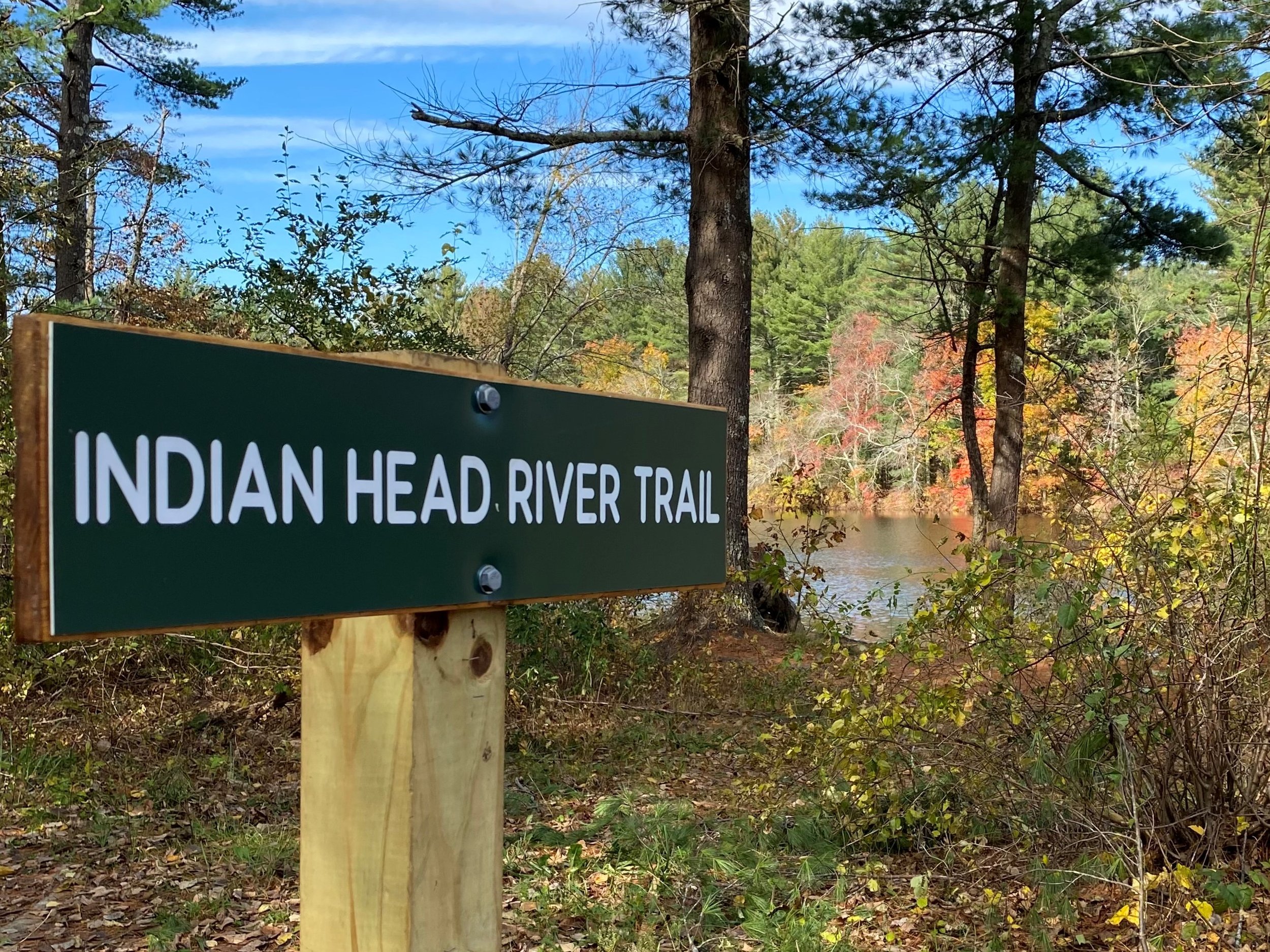
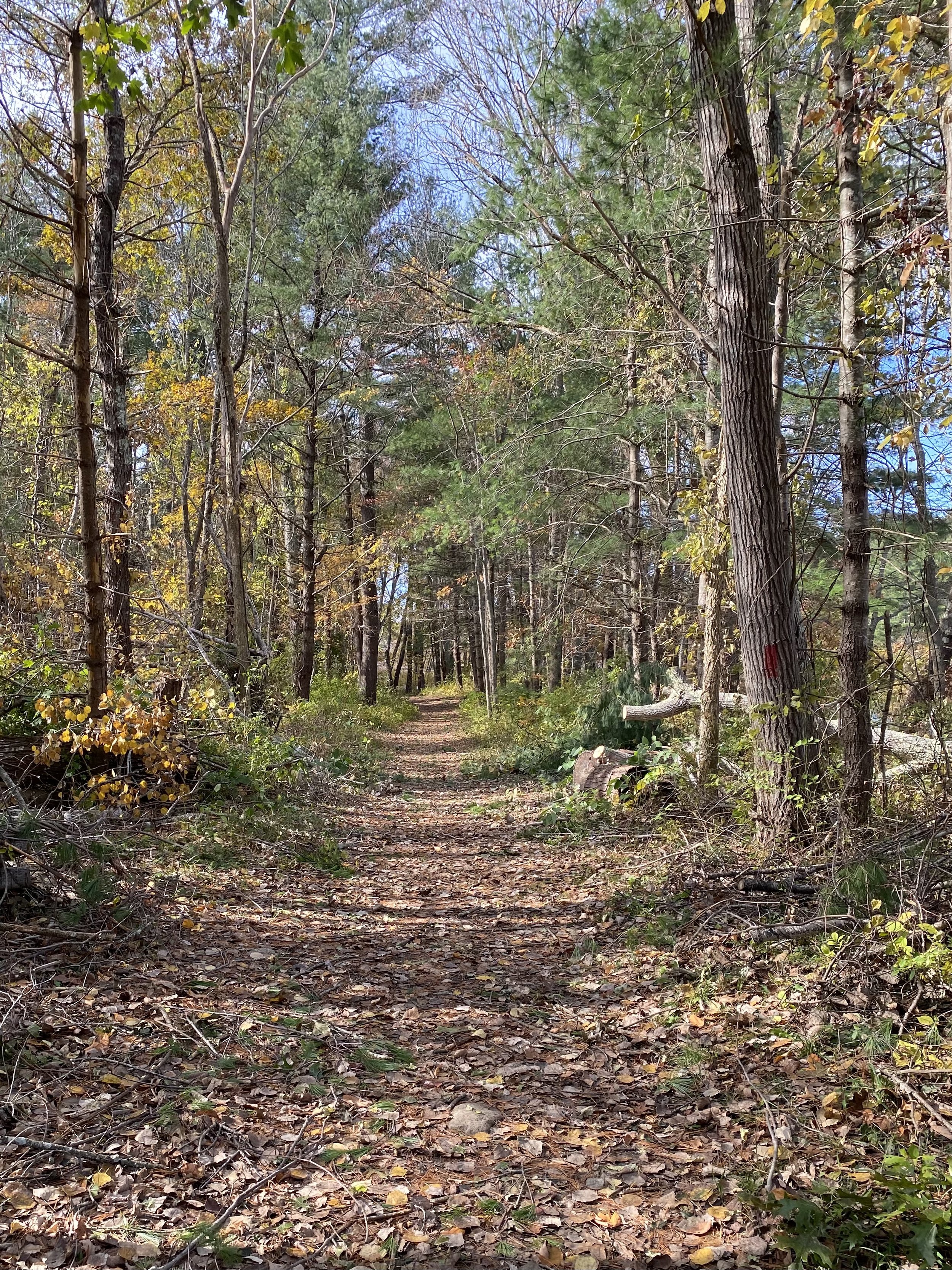
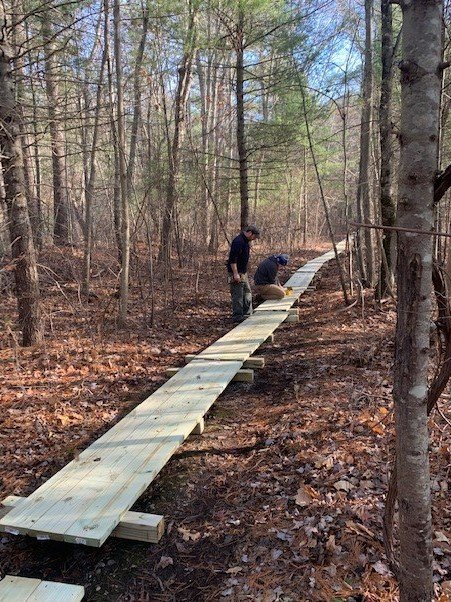
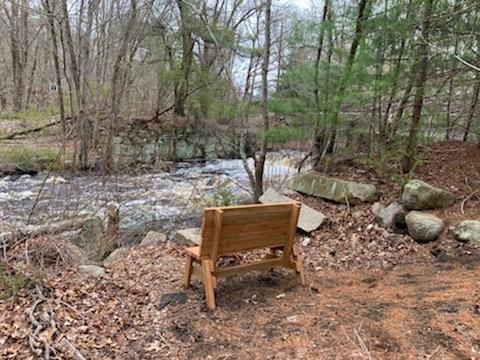
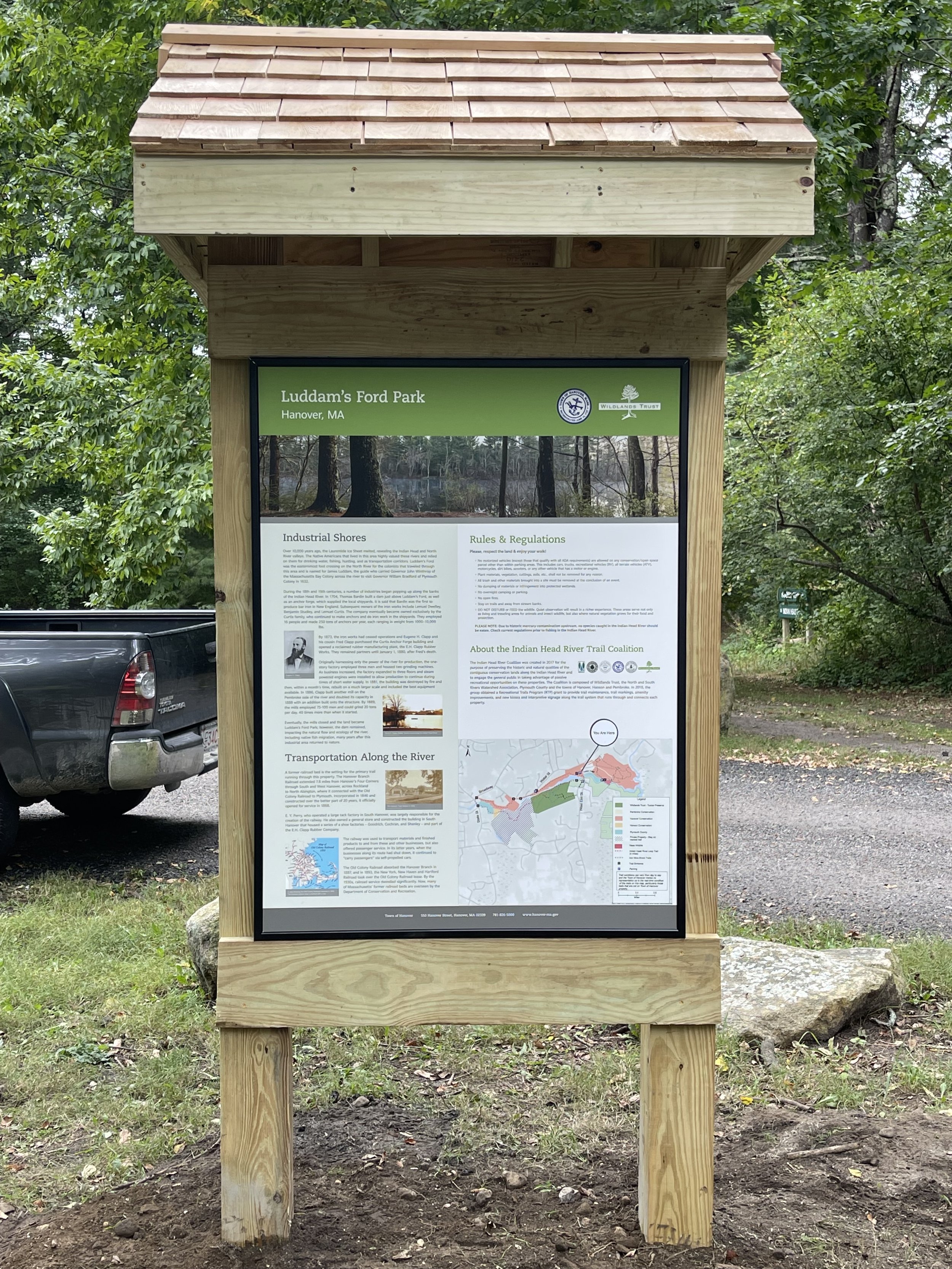
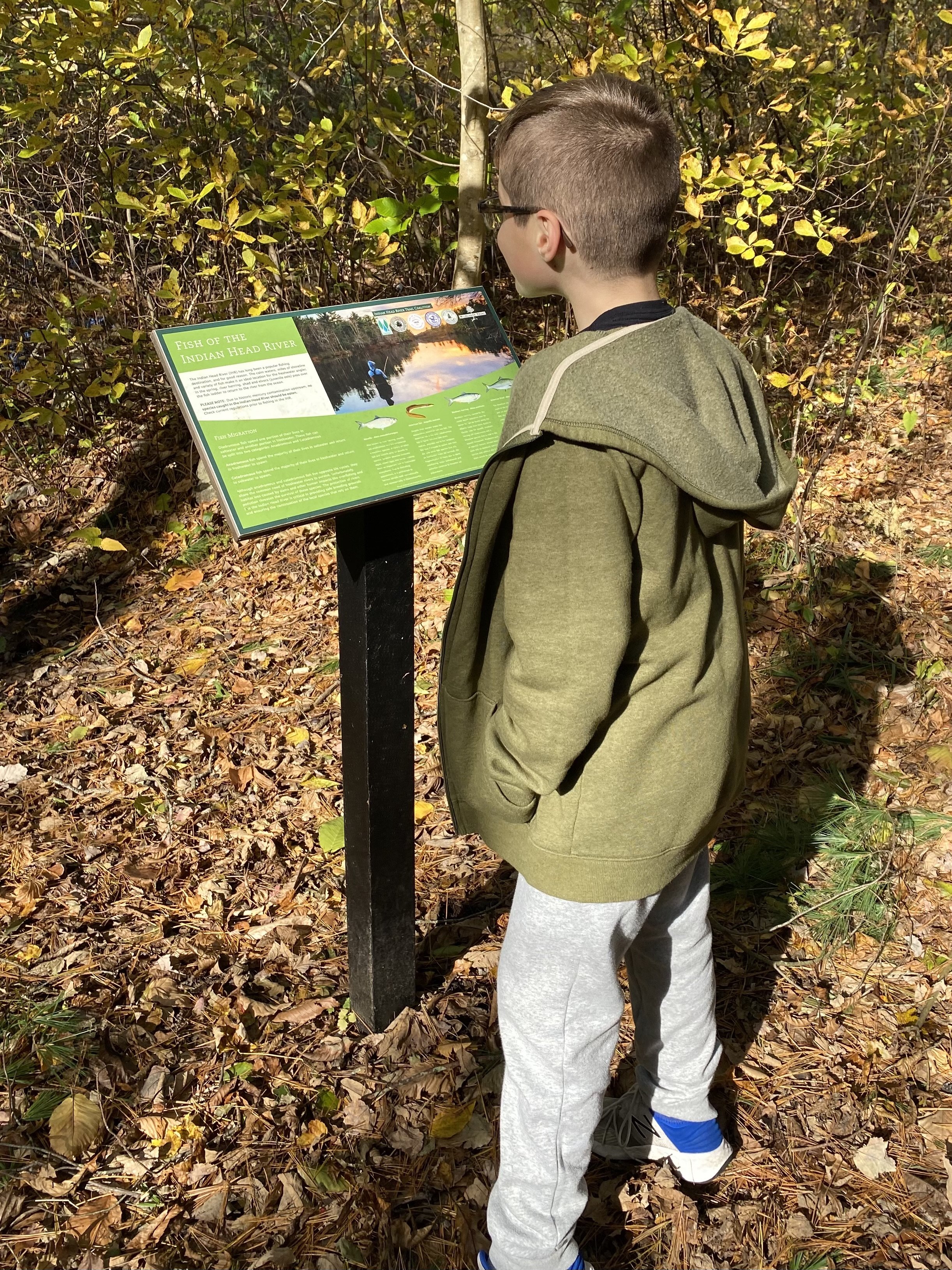
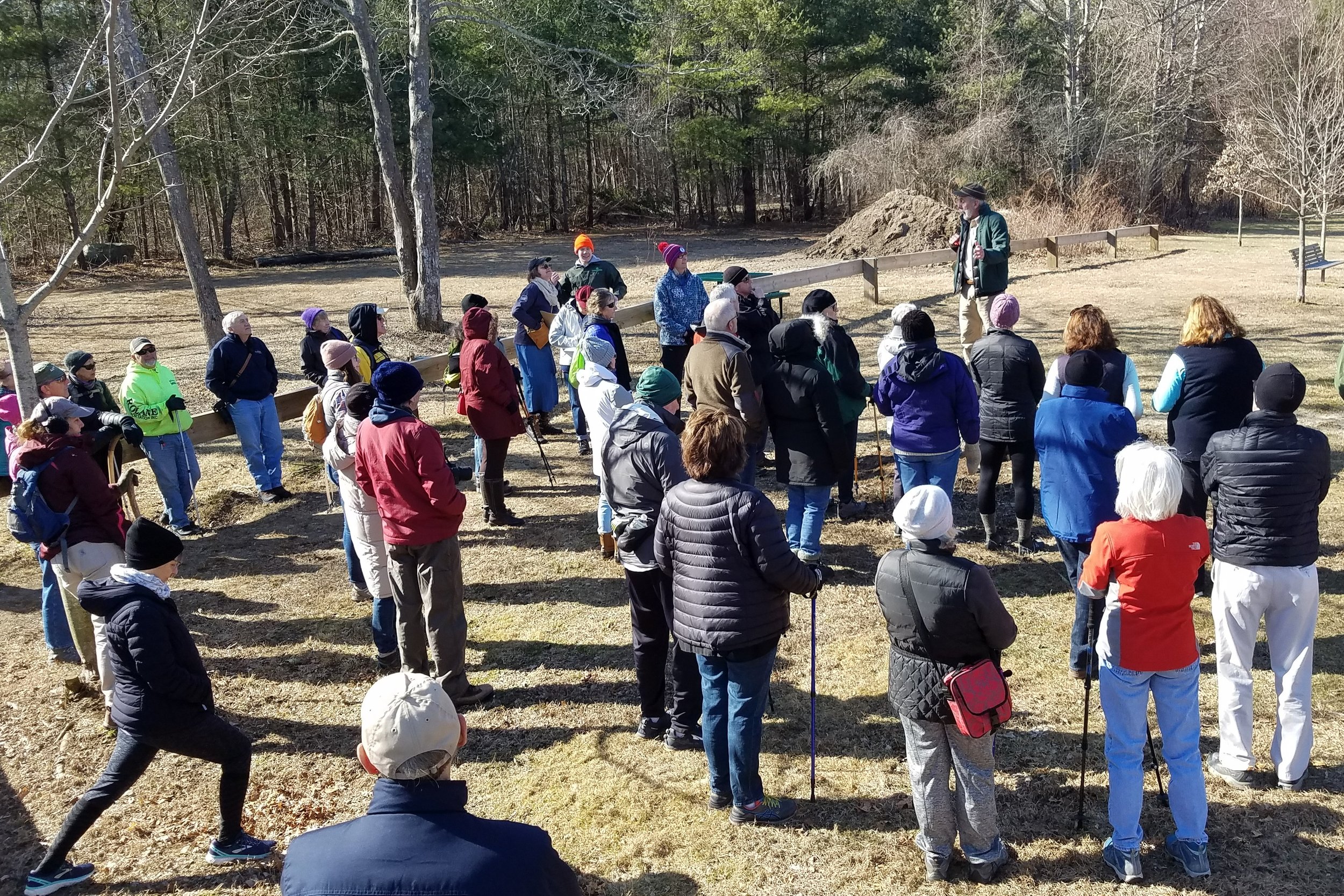
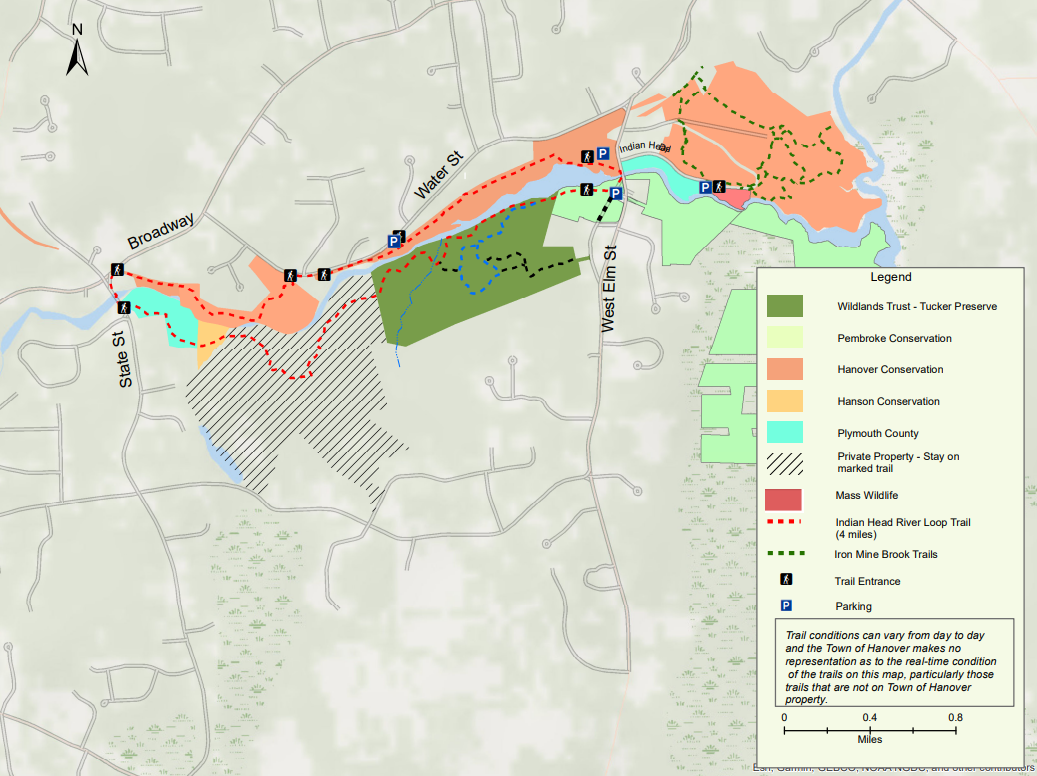
What Does It Mean to Be an Abutter?
By Amy Markarian, Senior Copywriter
Read Time: 5 min
By definition, an abutter is “a person who owns adjacent land.” When talking about conservation, this refers to anyone who owns property that shares a border with protected land. Sometimes, there are only a handful of abutters to a preserve, as may be the case in rural areas or when it is partially bordered by natural features (like the ocean or a river) or adjoining conservation lands. In other cases, particularly in more developed areas, one parcel of protected open space may be surrounded by several abutters. An example is when multiple residential properties border a preserve that lies within or behind a neighborhood. Regardless of the setting, it’s important for anyone who lives in proximity to conservation land to understand the unique benefits and responsibilities that come with being an abutter.
It’s easy to conjure a list of the benefits one enjoys when living close to protected land. Generally speaking, nearby property values are favorably impacted. Abutting landowners also benefit from access to open space and trails, and the natural landscape provides aesthetic value. Additionally, there is comfort in knowing that the environment surrounding one’s home will always remain in its natural state, without the threat of development. Wildlands is fortunate to have many positive relationships with our property abutters, who appreciate and respectfully enjoy the protected land they border.
However, not everyone understands the responsibilities that come with being a good neighbor to conservation land. Sometimes, according to Wildlands Trust’s Director of Stewardship Erik Boyer, “People don’t know who owns the woods behind their house, and they just don’t think to look into it.” This can lead to a number of challenges for organizations like Wildlands Trust, who are responsible for protecting the land. In some cases, an abutter’s lack of knowledge about the obligations of being a neighbor to a preserve can result in violations of conservation law. This is known as encroachment.
In general terms, encroachment is defined as the act of “trespassing upon the property, domain, or rights of another, especially stealthily or by gradual advance.” When property owners begin to use neighboring open space as an extension of their own yard, it is encroachment. Infringements can range from relatively minor and unintentional to significant and/or deliberate. Whatever the magnitude of the violations, they all threaten to damage natural environments and the wildlife that inhabit the area and, therefore, must be addressed. Erik points out that Wildlands Trust would much prefer to utilize our resources to maintain properties and trails for safe recreation than to address issues of encroachment from abutters.
What constitutes encroachment?
To prevent unintended violations, our stewardship team compiled a list of some of the problematic abutter behaviors that have been encountered on Wildlands’ properties, and the ways in which these encroachments threaten conservation land.
Dumping yard waste - This is one of the most common issues we see. People use neighboring woods to dump grass clippings and other yard waste, often with the misconception that, because the materials are “natural,” they don’t pose a threat to the environment. Unfortunately, the reality is that such materials are not at all conducive to native soil, and they are often treated with chemical fertilizers, insecticides, etc. that threaten both plants and animals.
Dumping trash - Man-made junk also gets thrown into the woods by homeowners or the contractors they hire. While most people (fortunately) don’t throw their household trash out the back door, it’s not uncommon to find items like scrap wood, shingles, and other unwanted items or equipment deposited on adjoining land. This creates both aesthetic and environmental issues.
Creating unauthorized trails and/or cutting trees to clear a scenic view - Cutting trees and clearing vegetation on conservation land is not allowed. Whether it serves to open up a homeowner’s view of a nearby pond or creates access from a neighborhood or private property to an existing trail system, without permission to do so, it is a violation. Wildlands welcomes volunteers to sign up and assist with trail maintenance on our properties, but reminds people that only Wildlands’ staff members are permitted to cut trees or create trails on our land.
Using motorized vehicles - ATVs, dirt bikes, snowmobiles, and other vehicles tear up trails, damage vegetation, and generate both noise and air pollution. They also pose a danger to other visitors passively recreating on the trails. Motorized recreational vehicle use is not allowed on any of Wildlands’ properties.
Building or digging beyond property lines - This is a significant and costly example of encroachment, whether it is done with the property owner’s knowledge or not. When building a shed or garage, or digging to install a driveway or pool, it is extremely important for abutting property owners to know the exact location of their property lines, and acquire appropriate permits before beginning such work. The permitting process alerts owners to applicable restrictions that may exist. Failing to obtain permits can have serious environmental consequences (especially when close to wetlands), and can become extremely costly and problematic for the abutter to resolve when violations are later discovered.
Hunting - While this is seldom an issue on our preserves, it is worth pointing out that owning property that abuts conservation land does not authorize someone to hunt on any land where it is not permitted. Doing so is unsafe for visitors and nearby residents, and it disrupts the natural habitat for wildlife.
As for what Erik most wants abutters to know, it boils down to, “Know the property lines and the rules of the adjacent conservation area, and be respectful.” Pay attention to posted regulations and don’t damage or remove informational signage. When issues arise, if necessary, conservation organizations have the law to fall back on, and pursuing litigation is an option. However, Wildlands’ stewardship team prefers to talk first, rather than jumping to a heavy-handed response. In the majority of cases, when people didn't realize their offense and wish to make amends, education and communication prove to be the best tools to resolve issues and maintain positive relationships with our neighbors.
Books and History Converge at Hoyt-Hall: Former Landowner Honored By Family
By Amy Markarian, Senior Copywriter
Read Time: 5 min
On January 23, just before a winter storm buried Hoyt-Hall Preserve under nearly two feet of snow, ground was broken for the installation of a new Little Free Library at the Careswell Street trailhead. The project was the brainchild of Steve Wood, who grew up spending time with family on the property once owned by his grandfather, Stephen Hall. To understand the significance of this meaningful gift, we traced back over 100 years to the Hall family’s early presence in the Marshfield community. Several family members shared their memories, creating a beautiful mosaic of memory, place, and kin.
In 1884, Walton Hall purchased the renowned Daniel Webster Estate (then called the Daniel Webster Farm) from Webster’s family. As its owner, Walton became a gentleman farmer, developing approximately 1000 acres of bogs and orchards along Webster Street and extending down to Green Harbor. According to his great-granddaughter, Michele Armour, when Walton died in 1928, his sons Lincoln and Lewis managed the farm and bogs. Later, Lincoln Hall bought the nearby property that is now known as Hoyt-Hall Preserve, where he lived and developed cranberry bogs that were utilized until the late 1960s. While the bogs that were once located on the Webster Street side of the property have since reverted to a natural state and the pond is no longer used for irrigation, evidence of the land’s agricultural history can be seen in the remnants of an old windmill on the property.
Michele remembers early childhood visits to this home – her grandfather piling the kids in the back of his truck and bumping down the unpaved road to the bog so they could help with the dry harvest of cranberries. After her grandfather’s death in 1969, Lincoln Hall’s son Stephen moved from Lexington to the Marshfield home, where he lived for many years with his wife Bella and daughter Michele. The couple’s older daughter Jackie was living on her own by then, but visited often with her young family–including sons Steve and Marc.
Stephen Hall had met his wife Bella in Paris, France, while serving in World War II. When the war ended and Bella emigrated to the United States with him, Stephen understood the challenges she may face and promised that her family would always be welcome to visit. Throughout their life together, Bella’s family members came to stay with them in Marshfield every year, often for extended visits, and once with as many as 14 people. Jackie and Michele got to know their distant relatives through these annual visits, and have profound recollections of time spent in the company of family on the spacious estate. Jackie’s sons, too, developed a close bond with their grandparents and other relatives there, spending holidays and vacations at the family home. With plenty of room for all, it offered a place for gathering and building connections with nature.
Both of Stephen Hall’s daughters have fond memories of their family’s outdoor adventures on the property – exploring the cranberry bog, the woods, and the pond that they used for fishing and boating. They remember, too, their father’s appreciation for the osprey that nested on the property. Stephen was a nature lover who spent a lot of time outdoors, clearing trails and observing wildlife. At the same time, according to Jackie, her father was also “enamored with, and knew just about everything there was to know about, Daniel Webster.” Having lived in the historic Daniel Webster House as a child, Stephen developed an interest that led him to become an avid Daniel Webster and Marshfield historian.
In his later years, Stephen Hall knew that the Careswell Street property meant too much to his family to risk being lost to development. When the family sold the land to Wildlands in 2000, he was comforted by the knowledge that it would be protected and beautified, with trails added for visitors to explore. According to Jackie, it meant a lot to her father to think that the land would be preserved and enjoyed by many. Michele considers it her father’s legacy to have the land protected in perpetuity, adding that the family couldn’t have asked for more than what it has become under Wildlands’ care today.
It is this sentiment that led Stephen Hall’s grandson, Steve Wood, to plan the donation of the Little Free Library at Hoyt-Hall Preserve this winter. He wanted to give back to Wildlands Trust for caring for the land his family loves, and the library is a gift that is both beneficial to visitors and meaningful for his family. Filled with intentionally selected books contributed by family members – about Marshfield, Daniel Webster, and wildlife – it honors his grandfather’s love of books and local history. Steve hopes the new little library will also foster a sense of community among preserve visitors through book sharing.
Little Free Library is a non-profit organization that supports the creation of small, weatherproof kiosks for donating and borrowing books. Steve Wood first saw a Little Free Library at a cafe near his home in Dorchester. After learning more about the initiative to promote reading, he installed well-utilized Little Free Libraries at both his home and the hospital where he works. This winter, Steve contacted Wildlands with his idea to install another one at Hoyt-Hall. Wildlands currently has Little Free Libraries on two other preserves - Willow Brook Farm, in Pembroke, and Brockton Audubon Preserve, in Brockton - and stewardship manager Owen Grey knew this addition would reach many people who come from all over the South Shore to hike at Hoyt-Hall Preserve.
We are thrilled that visitors will benefit from this meaningful gift, and we are equally grateful to have the opportunity to build lasting relationships with families through the preservation of land. Land conservation truly is about so much more than the number of acres on a map. Wildlands Trust serves individuals, families, and communities in order to help landowners fulfill the wishes they have for the natural spaces they care about. This process lays the foundation for relationships that last through generations. We are grateful to Steve Wood and the family of Stephen Hall for being a part of the Wildlands community!










Wildlands Trust Surpasses 50 Communities Served in Southeastern Massachusetts
By Amy Markarian, Senior Copywriter
Read Time: 2 min
PLYMOUTH– Wildlands Trust is celebrating an exciting milestone in land conservation. The self-described “small organization with a big reach” took on projects in two new towns – Norwood and Foxborough – at the close of 2021, bringing the total number of Massachusetts communities served to 51.
According to Wildlands Trust’s president and executive director, Karen Grey, the organization continuously works to forge new partnerships with the cities and towns as these relationships are the foundation for its land protection work. “We are committed to providing equitable access to nature throughout the entire region because all people deserve the benefits of nature every day, regardless of their zip code,” adds Grey, who grew up in the City of Brockton. Currently, across the 51 cities and towns in which Wildlands Trust is working, 1.7 million people are impacted by their conservation efforts.
In December, Wildlands Trust expanded its geographic reach to 50 towns, through a partnership with the Norwood Conservation Commission, in which Wildlands Trust holds the conservation restriction on a new Town-owned parcel of land. Norwood sits on the periphery of Wildlands Trust’s coverage area and the new parcel is located within a designated Massachusetts Environmental Justice area in the town. This designation is aimed at increasing the availability of parks and open spaces in urban environments that bear a disproportionate burden of the state’s development and industrial pollution. The permanent preservation of this parcel of open space in Norwood is both an important step toward the creation of a new riverfront park for the community, and a notable achievement in Wildlands Trust’s pursuit of equitable access to nature for all Massachusetts residents.
Also just before the close of 2021, a donation of 65 acres of land in Foxborough further expanded Wildlands Trust’s service area to 51 cities and towns. The organization celebrated several other year-end acquisitions in towns where their presence was already established as well. These include: the 16-acre Hart conservation restriction, which adds to an existing assemblage of protected land along Eagles Nest Creek, in Duxbury; and a 17-acre property within the headwaters area for Leonard Washburn Brook, in Lakeville.
Wildlands Trust is a non-profit organization dedicated to conserving land and preserving the natural heritage of Southeastern Massachusetts. The organization works to permanently protect and steward important habitats and landscapes, including woodlands and fields, ponds, coastal areas, agricultural lands, and river systems. Founded in 1973, Wildlands Trust has worked to protect nearly 13,000 acres of open space in 51 Massachusetts towns.

